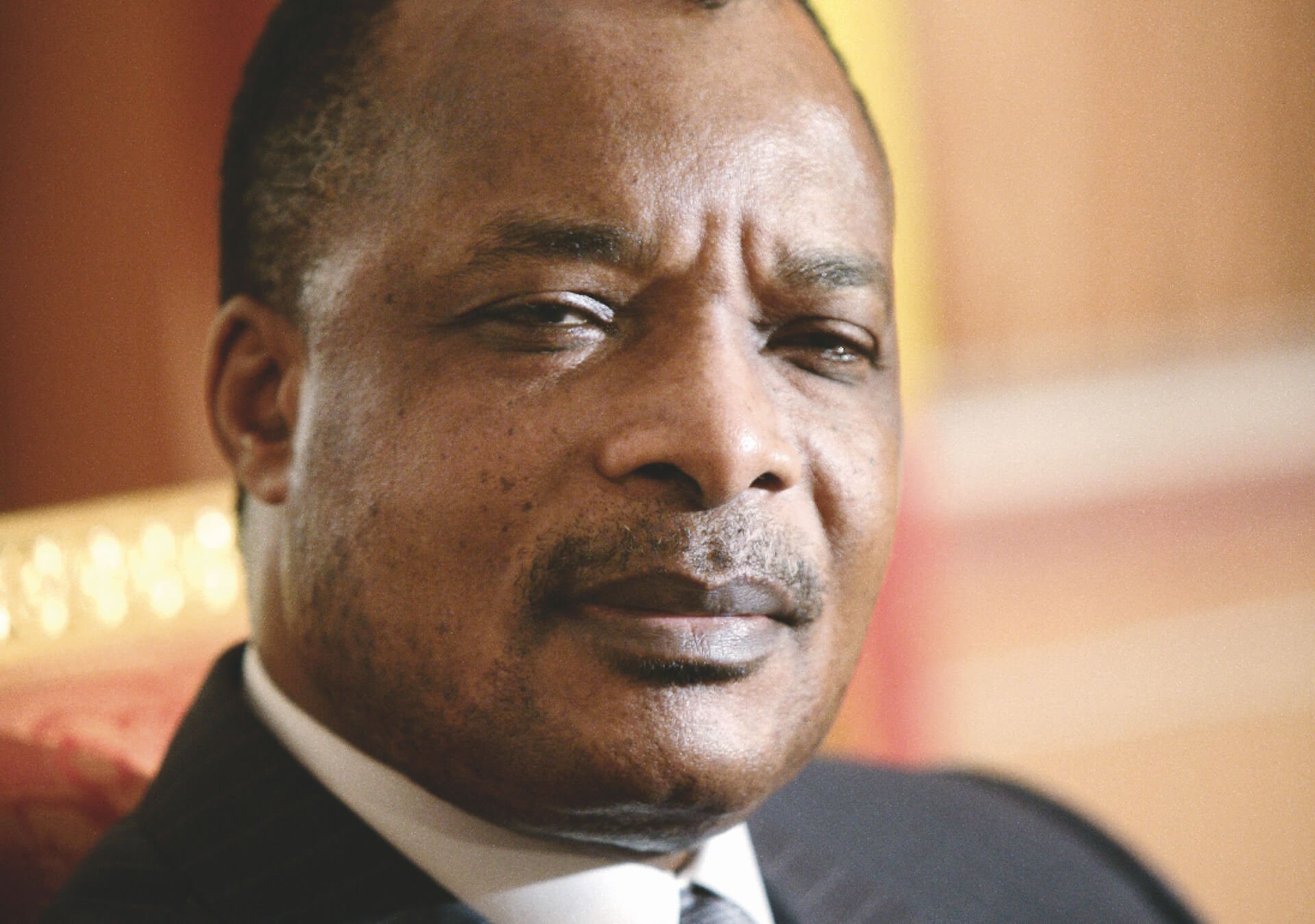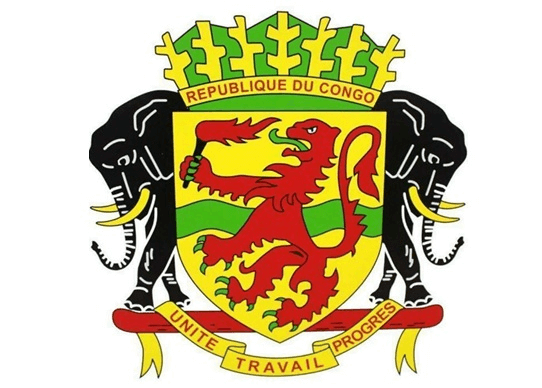Biography
Denis Sassou-N'Guesso was born in 1943 in Edou, a short distance from the town of Oyo, in the department of Cuvette in northern Congo. He attended primary school in his village of Edou and in Fort-Rousset (Owando), and was admitted in 1956 to the entrance exam for the College Raymond Paillet in Dolisie, one of the main schools that trained senior executives from Congo and French Equatorial Africa. Very early and in parallel to his studies in Dolisie, he became interested in the political life of the country, where, along with other friends of his age, he acquired a progressive ideological awareness within the Congo school association (Association scolaire du Congo, ASCO), for which he begins to take on some responsibilities. In 1960, he obtained the Brevet d'Etudes Elémentaires. At the time of embarking on a teaching career, another vocation opened up to him, the profession of arms. On the advice of his literature teacher Maurice Spindler, Denis Sassou-N'Guesso took the entrance exam to the inter-army school for reserve officers in Cherchell, Algeria (1961), from which he graduated at the top of his class with the rank of second lieutenant. Upon his return to Congo, he was one of the first officers to supervise the new Congolese army. He was then admitted to the infantry training school in Saint-Maixent, France, for the infantry officer course. Some time later, as an officer in the airborne forces, he was one of the privileged witnesses of the revolution of August 13, 14 and 15, 1963. Five years later, in order to readjust the revolution, he sided with the progressive wing of the army. With Marien Ngouabi (third President of the Republic of Congo, after Fulbert Youlou and Alphonse Massamba-Debat), he participated in the movement of July 31, 1968, which led one year later to the creation of the Congolese Party of Labour (Parti congolais du travail, PCT), of which he was a founding member. He was elected to the Party's Central Committee. In 1970, he joined the Political Bureau of the PCT.
Promoted to Captain in 1968, Commander in 1973, Colonel in 1978 and General of the Army, he was successively Commander of the Brazzaville Airborne Group, Commander of the Brazzaville military zone and Commander of the Ground Forces. In December 1975, a reorganization of the political board led to the creation of a Special Revolutionary Staff of the PCT, where he was reappointed as Secretary of the Central Committee in charge of the permanent commission for the army, a position he had held since 1972. After the death of President Marien Ngouabi on March 18, 1977, Denis Sassou-N'Guesso became Vice President of the Military Committee of the Party (Comité Militaire du Parti, CMP) in charge of the activities of the PCT party, Minister of Defense and Security.
On February 5, 1979, an extraordinary session of the Central Committee of the PCT put an end to the Military Committee of the Party (CMP), a provisional political board, instituted the day after the death of President Marien Ngouabi. He was elected President of the Central Committee of the PCT. The third Extraordinary Congress of March 1979 confirmed his election as head of the Party and consequently as head of the State. Elected 23rd President of the Organization of African Unity (OAU) in July 1986, he initiated several actions, among others: the creation of « Fonds Africa » in May 1987 in Brazzaville; the first international symposium of writers to fight effectively against the apartheid regime.
Having made a particular mark on Africa and the world during his term of office, and faced with the stalling of the four-party negotiations (United States, Angola, Cuba and South Africa), the parties to the conflict unanimously opted for Brazzaville to host the said negotiations, which led to the signing of the historic Brazzaville Protocol on 13 December 1988. This protocol enshrined Namibia's independence, the withdrawal of South African and Cuban troops from Angola, the end of apartheid, the release of Nelson Mandela and the advent of the new South Africa. In 1990, his ability to adapt to situations led him to open the country to multi-party democracy. In 1991, he accepted the holding of the Sovereign National Conference, which led to a political cohabitation that he assumed until the organization of democratic elections in 1992, at the end of which he withdrew from the power to make room for alternation of power.
In 1997, the government in power refused to hold normal presidential elections and led the country into a civil war that lasted from June 5 to October 15, 1997. Denis Sassou-N'Guesso returned to power at the end of the war on June 5, 1997. His constant ambition to reconcile the people with themselves led him, once again, to institute two frameworks for dialogue in order to create the conditions for a lasting environment of peace and security, namely, the National Forum for Reconciliation (Forum National pour la Réconciliation), the Unity and Reconstruction of Congo (l’Unité et la Reconstruction du Congo), in 1998, and the National Dialogue without Exclusivity (Dialogue
National Sans Exclusive), in 2001. On January 20, 2002, in an effort to promote a new political and institutional framework to allow for the expression of the people, he organized a referendum that resulted in the adoption of a new constitution. On March 10, Denis Sassou-N'Guesso was elected President of the Republic for a seven-year term.
In July 2003, always aware of Africa’s problems and challenged by the numerous conflicts destabilizing the continent, Denis Sassou-N'Guesso had a doctrine for security and peace called "Non-Aggression and Common Defense Pact" (Pacte de non Agression et de Défense Commune) adopted during a meeting of the African Union in Maputo, Mozambique. This is one more action that earned him his second appointment as Chairman of the African Union on January 24, 2006 in Khartoum. On July 12, 2009, he was re-elected President of the Republic for a seven-year term. In January 2010, he was elected Chairman of the CEMAC (Economic and Monetary Community of Central Africa (Communauté économique et monétaire de l’Afrique centrale), at the end of the 10th ordinary session of the Conference of Heads of State held in Bangui. In 2011, the African Union entrusted him with the mission of preparing the common position of Africa and being its spokesperson at the Rio+20 Summit. In 2013, he participated with the heads of state of several countries in the Elysée Summit for peace and security in Africa. The same year, he was appointed by his peers of the Economic Community of Central African States (ECCAS) , Mediator for the resolution of the crisis in the Central African Republic. In 2014, the debate on the evolution of the institutions in the Republic takes place in all layers of the Congolese society. The political class seized on the question of whether or not to change the current constitution.
On this topic, in May 2015, Denis Sassou-N'Guesso undertook a series of consultations with the political class and all the forces of the Nation. These consultations led to the convening of the "Inclusive National Dialogue" (Dialogue National Inclusive), held in Sibiti in July of the same year. Based on the recommendations of this dialogue, he called the people to a constitutional referendum, which was held on October 25, 2015. A new constitution was voted. Promulgated on November 6, 2015, this Constitution consecrates the entry of the country of Congo into the 6th Republic. With the presidential elections of March 20, 2026, Denis Sassou-N'Guesso was elected President of the New Republic, for a five-year term. In September 2017, Denis Sassou-N'Guesso received the "Almicar Cabral Medal", the national decoration of Guinea Bissau for his involvement in the resolution of the crisis in Guinea Bissau.
In 2021, the President was re-elected for a new term, from then on, Denis Sassou N'Guesso has multiplied his involvement in many national and international issues: the laws voted for a new economic dynamic around public-private partnerships, the crisis in Libya, the COP27, the sponsorship of the CIAN 2023 or the 3 Basins Summit (November 2023) and the underlying issue of forest protection. Indeed, the President is the first Head of State to have established the National Tree Day in the Republic of Congo. He is also at the origin of the creation of a national reforestation service (SNR) in order to further green the national territory. But also the initiative of the Blue Fund for the Congo Basin.
He keeps a particular attention to the institutional stability and peace in his country, crucible of any economic dynamics, he pays a particular attention to education, he also watches over the modernization of the infrastructures, the progression of its agriculture as well as the development of an eco-tourism.

